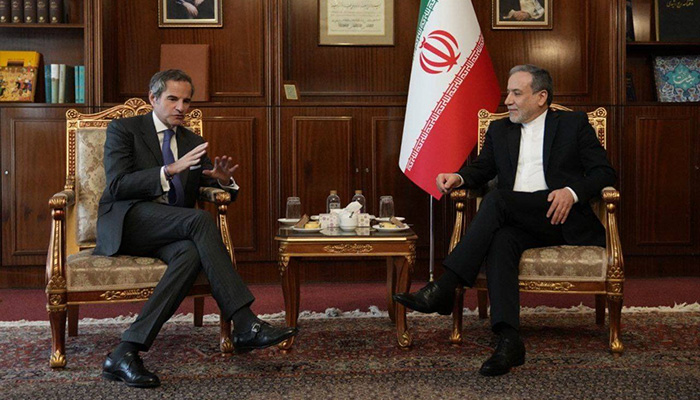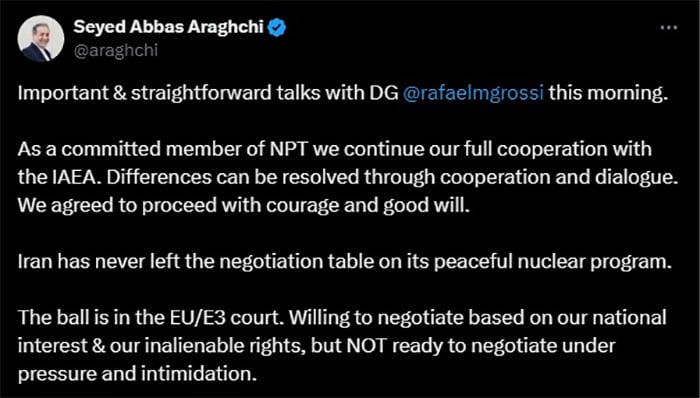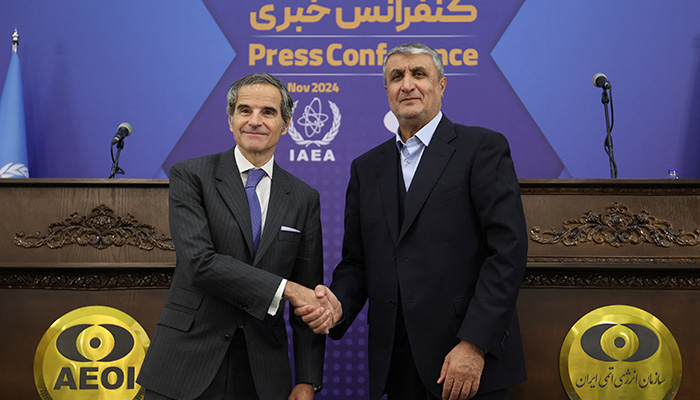
- “The ball is in the EU/European trio’s court,” Foreign Minister Abbas Araghchi says on Channel X.
- Tehran will send a message to the European powers via Grossi: Official.
- Head of Iran’s nuclear program says meeting with Grossi was “constructive”
Iran is ready to resolve outstanding disputes over its nuclear program but will not give in to pressure, Iran’s foreign minister told the head of the International Atomic Energy Agency on Thursday, as European countries seek diplomacy before Donald Trump returns to the White House.
“The ball is in the court of the European Union/European trio,” Foreign Minister Abbas Araqchi wrote on the At the conference. Nuclear talks.
Iranian state media quoted Araqchi as saying: “We are ready to negotiate on the basis of our national interest and our inalienable rights, but we are not ready to negotiate under pressure and intimidation.” “I hope the other side will adopt a rational policy.”

A senior Iranian official said Reuters Tehran will send a message to the three European powers through Grossi regarding Tehran’s seriousness in resolving its nuclear crisis, while stressing that any pressure on Tehran will have the opposite effect.
The diplomats said Reuters Britain, France and Germany are seeking a new resolution against Iran by the International Atomic Energy Agency’s board of directors next week to pressure Tehran over what they see as weak cooperation, Britain, France and Germany said on Wednesday.
Trump’s return to office as US president in January upends nuclear diplomacy with Iran, which had faltered under the outgoing administration of Joe Biden after months of indirect talks.
During Trump’s previous presidency, Washington abandoned the 2015 nuclear agreement between Iran and six world powers that limited Tehran’s nuclear activities in exchange for relief from international sanctions.
Trump has not fully made clear whether he will continue his “maximum pressure” policy on Iran when he takes office.
Relations between Tehran and the International Atomic Energy Agency have been strained over several long-standing issues, including Iran’s prevention of the agency’s uranium enrichment experts from entering the country and its failure to explain traces of uranium found in undeclared sites.
In August, the agency said that Iran’s production of highly enriched uranium was continuing, and it had not improved cooperation with it, despite a decision issued by the agency’s Board of Governors in June.
“Inspections are just one chapter of our cooperation and cannot be discussed,” said Grossi, who has long sought progress with Tehran on its rapidly advancing nuclear activities.
The United States’ withdrawal from the nuclear agreement in 2018 and the reimposition of sanctions prompted Tehran to violate restrictions on uranium enrichment, which the West considers a disguised attempt to develop the ability to make nuclear weapons.
Tehran is now enriching uranium to a fissile purity of 60%, which is close to the approximately 90% required to make an atomic bomb. Tehran says its nuclear activities are for peaceful purposes only.
The head of Iran’s nuclear program, Mohammad Eslami, said that his meeting with Grossi was “constructive” but warned that Tehran would immediately respond to any decision against it at the International Atomic Energy Agency meeting next week, without going into details.

A senior Iranian official told the news agency on Wednesday that Tehran’s reaction to the decision could be to limit diplomatic and technical cooperation with the International Atomic Energy Agency.
In a joint televised press conference with Eslami, Grossi urged Tehran to take steps to resolve the remaining issues.
“Here we can take concrete steps that clearly indicate to the United States and the international community that we can clarify matters and move forward with concrete solutions,” Grossi said.
Grossi, who arrived in Tehran on Wednesday, met with Iranian President Masoud Pezeshkian for the first time since Pezeshkian took office in August. The head of the International Atomic Energy Agency is scheduled to visit the Iranian Natanz nuclear plant and the Fordow site dug into the mountain.
Pezeshkian, seen as a relative moderate, said on Tuesday that Tehran would not be able to ignore its arch-enemy the United States and that it needed to “deal with its enemies patiently.”
